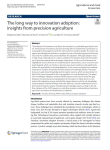Masi M., De Rosa M., Vecchio Y., Bartoli L., Adinolfi F. (2022). The long way to innovation adoption: insights from precision agriculture. Agricultural and Food Economics, 01/12/2022, vol. 10, p. 1-17.
https://doi.org/10.1186/s40100-022-00236-5
https://doi.org/10.1186/s40100-022-00236-5
| Titre : | The long way to innovation adoption: insights from precision agriculture (2022) |
| Auteurs : | M. Masi ; M. De Rosa ; Y. Vecchio ; L. Bartoli ; F. Adinolfi |
| Type de document : | Article |
| Dans : | Agricultural and Food Economics (vol. 10, December 2022) |
| Article en page(s) : | p. 1-17 |
| Langues : | Anglais |
| Langues du résumé : | Anglais |
| Catégories : |
Catégories principales 06 - AGRICULTURE. FORÊTS. PÊCHES ; 6.4 - Production Agricole. Système de ProductionThésaurus IAMM AGRICULTURE DE PRECISION ; ADOPTION DE L'INNOVATION ; DURABILITE ; GESTION DU SOL ; QUALITE ; NOUVELLE TECHNOLOGIE ; TRANSFERT DE CONNAISSANCES ; AKIS ; DEVELOPPEMENT RURAL ; ITALIE |
| Résumé : | The adoption of innovations may boost the transition to sustainable agricultural models. Among these innovations, precision farming offers a fundamental contribution to sustainable soil management and the improvement in product quality. The work is set against this background and aims to analyse the rate of introducing precision farming tools and the variables that prevent/facilitate this adoption. Although adoption rates in Italy remain relatively low, it is vital to underline the obstacles that limit the broader use of precision agricultural technologies inside farms. To this end, the literature has highlighted various elements of complexity (farm characteristics, socio-economic and psychological), which can hinder or generate perceived complexity and significantly reduce the potential for technology adoption. In this context emerges the increasing importance of public and private activities related to knowledge transfer. The paper focuses on agricultural knowledge and innovation systems, which are also relevant in light of the recent proposal for the new regulation on rural development. The awareness–knowledge–adoption–product (AKAP) sequence was used to reveal the gap between the potential and actual adoption of innovation on Italian farms to comprehend the adoption process and identify relevant barriers and the role knowledge systems played. Empirical findings show that AKIS has a critical mediating function in promoting innovation uptake. Strengthening knowledge systems, acting on the different phases of the AKAP sequence, could allow a greater understanding of precision agriculture techniques and bottlenecks to adoption. |
| Cote : | En ligne |
| URL / DOI : | https://doi.org/10.1186/s40100-022-00236-5 |







